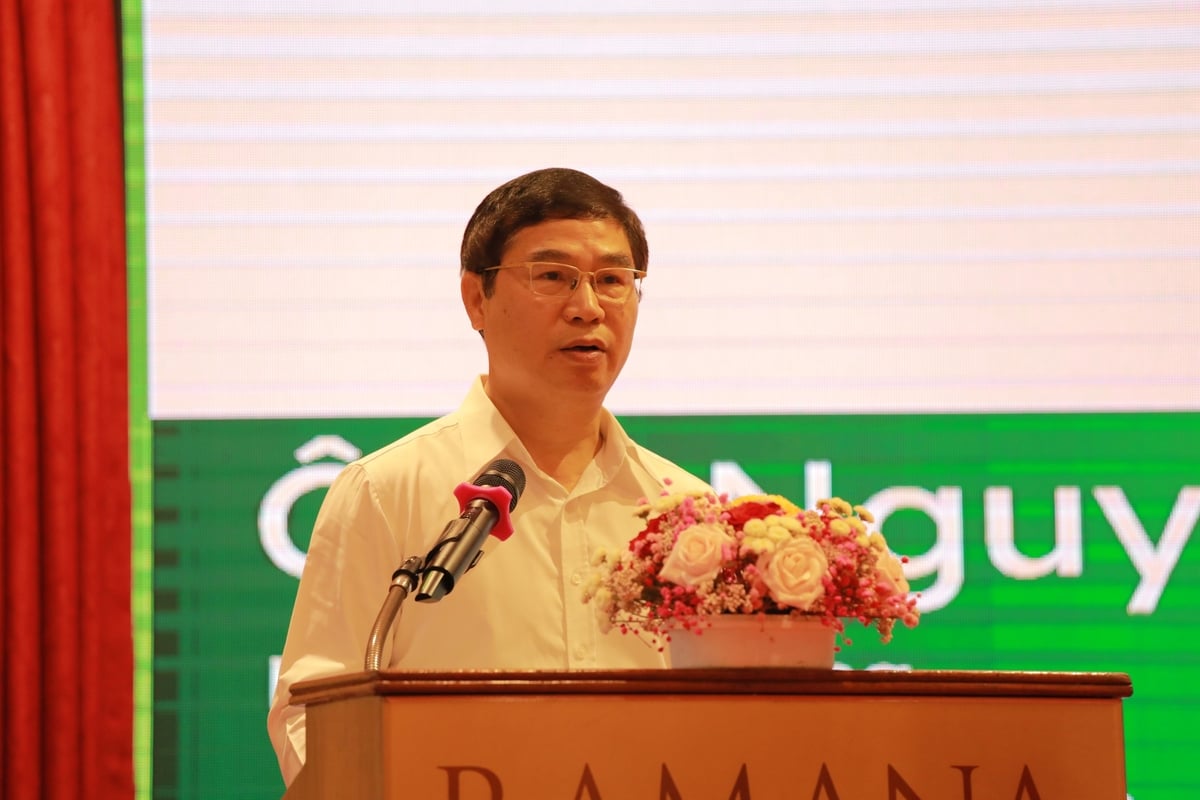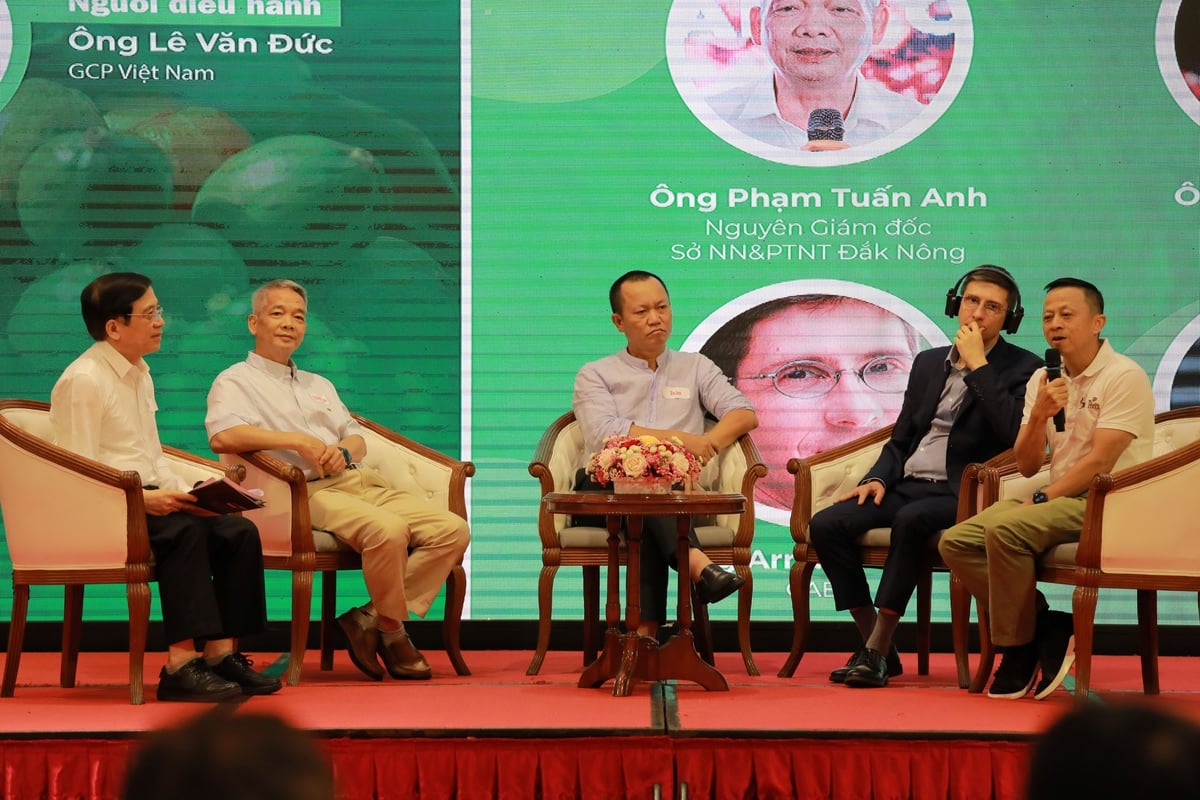June 18, 2025 | 09:06 GMT +7
June 18, 2025 | 09:06 GMT +7
Hotline: 0913.378.918
June 18, 2025 | 09:06 GMT +7
Hotline: 0913.378.918
Having been involved with coffee cultivation for over 20 years, Mr. Nguyen Van Luc from Nam Nung commune (Dak Nong) is witnessing profound changes in his coffee farm.
According to Mr. Luc, before 2022, his coffee farming, like most farmers’, involved spraying herbicides, applying fertilizer multiple times, and focusing on yield. However, the more they did, the more the soil became degraded, the plants weakened, productivity did not improve, and profits steadily declined. The turning point came when he was invited to participate in a training course on environmentally friendly weed management, part of the activities under the “Collective Action Initiative for Responsible Use of Agricultural Inputs in the coffee sector” (CAI initiative) launched by the Global Coffee Platform (GCP).

Mr. Nguyen Van Luc tends to his family's coffee farm. Photo: GCP.
“At first, I thought it was just theory. But after a few trial crops, I completely changed my mind. Keeping the weeds helps retain soil moisture, earthworms return, watering is reduced, fertilizer use drops significantly, the plants are healthier, and yield increases from 4 to 6 tons, with fertilizer costs cut by nearly 40%,” Mr. Luc Luc shared.
Mr. Luc’s story is not unique. Over the 5-year implementation period from 2020 to 2025 across five Central Highlands provinces, the initiative has accompanied thousands of farmers, transforming old farming habits into a responsible agricultural model, while also paving the way for Vietnamese coffee to approach global standards.
At the closing ceremony of the Collective Action Initiative for Responsible Use of Agricultural Inputs in the coffee sector recently held in Ho Chi Minh City, Mr. Nguyen Quy Duong, Deputy Director of the Plant Production and Protection Department, emphasized that the CAI initiative was born at a time when the coffee sector faced challenges related to quality and the risk of being excluded from major markets due to pesticide residues.

Mr. Nguyen Quy Duong, Deputy Director of the Plant Production and Protection Department, speaks at the program. Photo: Ha Duyen.
According to Mr. Duong, after 5 years, the initiative has proven that mindset change is the foundation for sustainable development. One of the most important achievements is the significant reduction of glyphosate residues - a substance strictly regulated in the EU. The percentage of coffee containing glyphosate residues dropped from 56% in 2020 to only 1.2% in 2023, helping Vietnam meet stringent export standards.
Not limited to a technical perspective, the initiative also created a network connecting businesses, farmers, regulatory agencies, and international organizations, forming the foundation for an effective public-private partnership model. “We recognize the project’s ripple effects not only in the pilot areas but also expanding to other localities through training, communication, and a network of local technicians. This is an initial step to scale up green and circular production,” Mr. Duong said.

The delegates discuss solutions to promote sustainable production in the coffee sector. Photo: Ha Duyen.
From a broader perspective, Dr. Le Quoc Doanh, former Deputy Minister of the Ministry of Agriculture and Rural Development, highly appreciates the results achieved by the GCP initiative and regards it as an important step in the coffee sector’s restructuring journey. “Vietnamese coffee has come a long way, from a few tens of thousands of hectares before liberation to over 700,000 hectares in recent years, with export turnover reaching nearly 4.8 billion USD in the first five months of 2025. But to maintain and enhance our position, we must shift from volume-driven production to responsible production,” Dr. Le Quoc Doanh said.
Mr. Doanh emphasized that sustainable production is not only about individual farms but encompasses the entire value chain, from inputs, cultivation, processing to traceability. “We cannot continue production where everyone acts independently, using pesticides indiscriminately and fertilizers without control. That is a worn-out approach that does not lead to sustainability,” Dr. Le Quoc Doanh stressed.
According to him, the combination of farmers, businesses, scientists, and government is the key formula to create change. He cited previous replanting programs, showing that when there is a transparent, simple, and easy-to-apply technical package, farmers will change. And this is clearly demonstrated by the results of the GCP initiative.
“If we continue to maintain the spirit of cooperation and responsibility as we do now, Vietnamese coffee will not only retain its leading export position but can also rise to become the world leader in quality and sustainability,” Dr. Le Quoc Doanh expressed.
Translated by Phuong Linh

(VAN) The primary prerequisite for the comprehensive and robust integration of Vietnam's livestock sector into the global value chain is the establishment of a disease control system.

(VAN) The results of national programs are essential for establishing a contemporary livestock sector that is well-equipped to meet the demands of both domestic and international markets, with robust biosafety standards.

(VAN) The UNESCO Global Geopark revalidation of Non nuoc Cao Bang and the transition to a two-tier administrative model are presently undergoing a pivotal moment in Cao Bang, the northernmost province of Vietnam.
/2025/06/13/5330-2-004539_953.jpg)
(VAN) Changing policy mindset and removing investment barriers are urgent requirements to open up new development space for enterprises in the agricultural sector.

(VAN) The areas include the restoration of five million hectares of marine ecosystems.

(VAN) Dr. Le Van Nguyen, Director of the Institute of E-Commerce Management (ECM), emphasizes the potential for green development through the cultivation of fruit trees, particularly in provinces such as Son La.